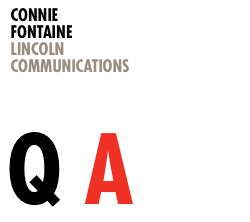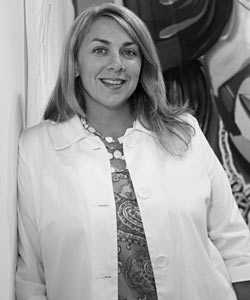Sponsors
Connie Fontaine is the Lincoln Communications Manager, and spearheads the Warriors in Pink initiative supporting Susan G. Komen for the Cure. Find out more at fordcares.com.

- How did Ford get involved with the fight against breast cancer, and at what point did you join?
- Ford started our breast cancer awareness initiative 16 years ago, when a group of women within the company took this on. We've been partnering with the Komen Foundation for all those years and have dedicated a lot of resources to the organization. I've been involved for six years. Warriors in Pink, we launched a few years ago now, and as I've moved and changed jobs, I've been selfishly taking it with me. We work hard. Every time you've got something really great, that's the scary part: How can you make it better next time? And the fun part is, we've been able to grow it and change it and make it better every year.
- What's a favorite promotion you've done with Warriors in Pink?
- Actually, I loved our launch campaign around Warriors in Pink, our first campaign. It was about really strong, powerful women, and it had this very strong tribal feel. We knew it was going to connect immediately; we'd done enough research to know we were going to connect. The launch campaign had these visuals that were really compelling -- our own set of symbols. We thought, at least if you don't resonate with all of it, something's going to touch you, whether you're a survivor or a friend, a sister, brother, father, mother.
- We do a lot of integrations with TV. The best one we had was with Army Wives -- Warriors in Pink was part of the script, we were an integral part of the cast. The cause was so integrated from the beginning to the end of the whole season. We had custom apparel that was all about the Army Wives theme. It does give us a chance to do unique things. We just did an interesting integration with Vampire Diaries, and we did something with 90210 last year which was, again, integrated into the script. We usually like to be part of a storyline that is more positive, but in this case one of the characters' mothers was diagnosed and was pretty far along. In the story, she died, and one of the other characters then becomes a Warrior, and wants to be part of the fight against breast cancer. It was pretty powerful. We're doing an integration with The Biggest Loser that airs sometime around Thanksgiving weekend. The show visited Dearborn to do auditions, and we used the background of World Headquarters and everyone was in Warriors in Pink gear. Alison, Bob and Jillian were wearing Warriors in Pink gear and doing public service-like communications for TV, as well as a print ad that will merchandise both the show and our program. It drives traffic to Ford Cares, and drives traffic to our message of how important early detection is. We've found that a celebrity voice is really effective. Right now, with CBS, celebrities from their nighttime programming are doing their own "early detection is important" campaign. They do this little message that plays during October and that drives traffic to the Ford Cares site as well. We did this last year, and we're doing it again this year, even more. You know, let a celebrity stop people in their tracks and tell people that early detection is important.
- Why do celebrities and TV shows like to work with us? Because we co-promote the show, we do a print piece, and because it's rewarding to them to help share the message. Generally, our business model is: we connect with a show where we know we can help create the messaging so it's meaningful and people will want to be part of it. We're trying to raise awareness of early detection. And we do raise substantial amounts of money. So -- join us! Join us in the fight.
- How does your internal workforce take part of Warriors in Pink?
- We're the national sponsor for the series of Komen Race for the Cure events -- 122 races around the country and more in Canada, Puerto Rico ... We involve our regional employees, our dealerships and their employees. At home in Detroit, we do our own Race for the Cure, and we make a big deal out of that. Our world headquarters we lit up pink last year, and we did it again this year in an even bigger way.
- I'm hearing that a lot: We did it once, now we’re doing it again but better.
- That's kind of our marketing mantra: OK, we did that, now what can we do to make it bigger or better?
- It's clear you've got a really committed group, just from the energy and creativity you see from this initiative. Is there something personally that drives you?
- For me, it's part of my area of responsibility, but what has kept me personally committed is: It's just that one part of your job where you know you're making a difference every day. You know there are going to be people who change their behaviors because of it. We're constantly getting notes, internally and externally, about people's love of the program, what it's meant to them, what it's done for them. On Facebook, I think we're at one hundred thousand fans. We were at something like forty thousand, and we said, in October for every "Like" we're going to donate an additional dollar. Sometimes on Facebook, within a few minutes you'll see 700 "Likes," or hundreds of comments on one post, and when you read these ongoing dialogues, it definitely keeps our passion committed. And add to the fact that breast cancer touches all of us in one way, shape, or form.
Alan Mulally, our chair, is sincerely behind this effort. He wears his Warriors in Pink tie. He videotaped a very strong message on our website in support of early detection. He takes Warriors in Pink gear on his road trips. He's really proud of it. And there's this overwhelming sense of inclusion. It's something we all own and we can get behind. Through Ford Cares, we dedicate a lot of money to the cause, and we make a lot of cash donations, raised from our apparel sales. We actually raise a lot of money from apparel. Beyond Ford's work, there are a lot of great charitable organizations. It's just about finding the one that fits you. We have a strong relationship with Komen -- we like their focus on research, treatment, on serving women who are not capable of spend money on their own medical care. And they're big enough and they're well run enough that we know where the money's going. But there are lots of other organizations out there, and we're all in this for the fight. That's the overarching idea when you've got a cause like this.

